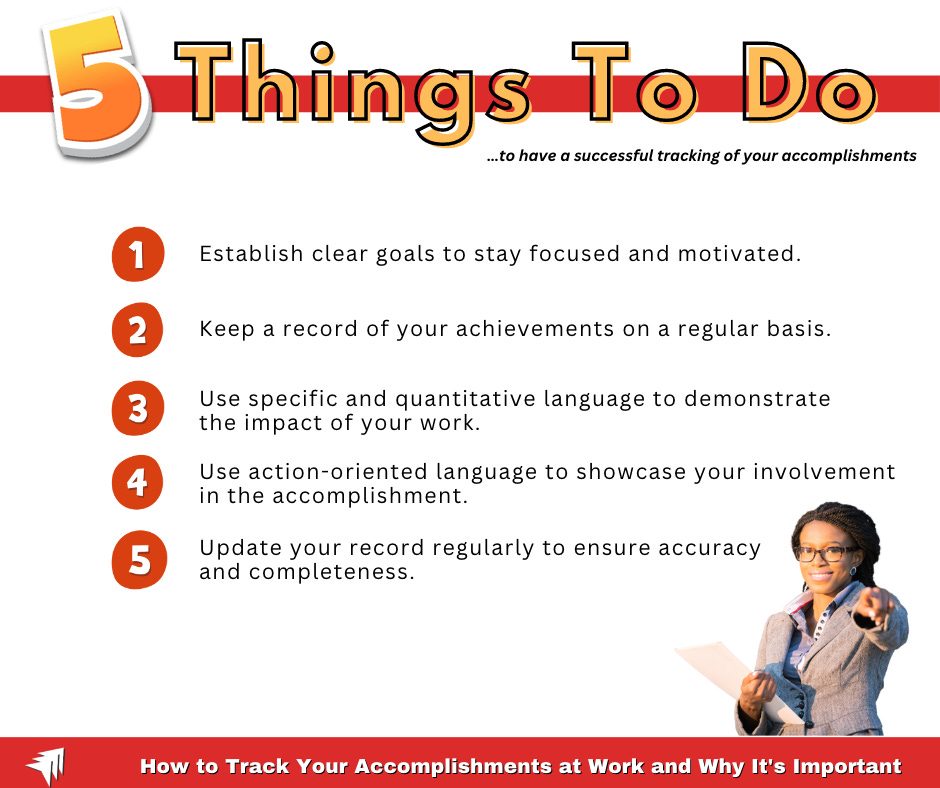How to Track Your Accomplishments at Work and Why It's Important
How to Track Your Accomplishments at Work and Why It's Important
As professionals, we often have many responsibilities and tasks to complete at work. It's easy to forget or overlook our accomplishments, which can be detrimental to performance reviews, salary negotiations, or even when updating our resumes. Tracking your accomplishments is essential for advancing your career and gaining recognition for your hard work. In this article, we'll explore the benefits of tracking your achievements and provide tips on how to get started.
Why Tracking Your Accomplishments Is Important
Tracking your accomplishments at work is crucial for several reasons. Firstly, it allows you to keep track of your progress and development. When you document your achievements, you can see how far you've come and what you've accomplished. Secondly, it helps you to identify areas for improvement. When you know what you've done well, you can also see where you need to focus your efforts in the future. Lastly, tracking your accomplishments provides a record of your work that can be used to show your value and contributions to your organization.
How to Track Your Accomplishments
Tracking your accomplishments doesn't have to be complicated. Here are some tips to get started:
1. Establish Goals
Before you start tracking your accomplishments, it's crucial to establish your goals. Determine what you want to achieve and what success looks like to you. Having clear goals in mind will help you to stay focused and motivated.
2. Keep a Record of Your Achievements
Keep a record of your achievements regularly. You can create a spreadsheet or document to record your accomplishments. Please include the date, the action, and any relevant details, such as its impact on the organization or team.
3. Be Specific and Quantitative
When recording your accomplishments, be specific and quantitative. Use numbers and metrics to demonstrate the impact of your work. For example, instead of saying, "I completed a project," say, "I completed a project that saved the company $50,000."
4. Use Action-Oriented Language
Use action-oriented language when describing your accomplishments. Use words such as "completed," "implemented," "led," and "achieved." This type of language is more powerful and demonstrates your involvement in the accomplishment.
Benefits of Tracking Your Accomplishments
1. Helps with Performance Reviews and Salary Negotiations
When it comes to performance reviews or salary negotiations, having a record of your accomplishments can be invaluable. It allows you to demonstrate your contributions and your value to the organization. This can help you to negotiate a higher salary or promotion.
2. Boosts Confidence and Motivation
Tracking your accomplishments can boost your confidence and motivation. When you see what you've accomplished, you feel a sense of pride and satisfaction. This can help you to stay motivated and focused on achieving your goals.
3. Provides a Record of Growth and Progress
You can see how far you’ve come and your progress when you track your accomplishments. This provides a sense of accomplishment and can help you identify growth and improvement areas.
4. Helps with Resume Building
When updating your resume or LinkedIn profile, having a record of your accomplishments makes the process much easier. You can refer to your list of achievements and include them in your resume or online profile. This can help you stand out to potential employers and increase your chances of an interview.
Common Mistakes to Avoid When Tracking Accomplishments
When tracking your accomplishments, there are a few common mistakes to avoid. These include:
• Forgetting to document your achievements in real-time
• Focusing too much on quantity over quality
• Not being specific or detailed enough
• Failing to include the impact or results of your work
• Neglecting to update your record regularly
To avoid these mistakes, regularly track your accomplishments and provide specific, detailed information about your work.
Conclusion
Tracking your accomplishments at work is essential for advancing your career, gaining recognition for your hard work, and boosting your confidence and motivation. By establishing clear goals, keeping a record of your achievements, and using specific, quantitative language, you can track your accomplishments effectively and reap the benefits.
"The Power of Moments": How Ordinary Experiences Can Create Extraordinary Impact
Are you tired of living an ordinary life and looking for ways to create more meaningful experiences? If so, "The Power of Moments" by Chip Heath and Dan Heath is the perfect read for you. This book explores how we can transform ordinary experiences into extraordinary moments that shape our lives and leave a lasting impact.
One of the most powerful messages in the book is the importance of recognizing and celebrating our accomplishments. This message aligns perfectly with our article on tracking achievements at work. The article emphasizes the benefits of keeping a record of our accomplishments and using specific and quantitative language to describe them. "The Power of Moments" takes this concept further, arguing that intentionally creating defining moments around our accomplishments can create memories that shape our lives and leave a lasting impact.
The authors explore four elements that make defining moments so powerful: elevation, insight, pride, and connection. Elevation refers to experiences that rise above every day and leave us feeling uplifted and inspired. Wisdom relates to experiences that lead to a profound understanding or shift in perspective. Pride refers to incidents that create a sense of accomplishment and self-worth. Connection refers to experiences that strengthen relationships and develop a sense of belonging.
The authors show how various areas of life, from business to education to personal relationships, can apply these elements by providing numerous examples. For example, they share the inspiring story of a school in a low-income area of Chicago that transformed its graduation ceremony into a defining moment for its students by incorporating elements of elevation, insight, pride, and connection.
Overall, "The Power of Moments" is a powerful reminder of our experiences’ impact on our lives and those around us. We can create a greater sense of purpose, meaning, and joy by intentionally creating more defining moments.
"The Power of Moments" offers insights and advice that individuals can apply to personal development and self-improvement, in addition to connecting with our article on tracking accomplishments at work. The authors encourage readers to seek out experiences that challenge their comfort zones and create opportunities for growth and development. They also emphasize the importance of cultivating relationships and creating connections with others, as these experiences can be some of the most defining moments in our lives.
One of the most powerful messages in the book is the idea that we have the power to create our defining moments. By intentionally seeking out experiences that align with elevation, insight, pride, and connection, we can create memories that shape our lives and leave a lasting impact.
Call to action: Intentionally create a defining moment in your life today. Whether celebrating a personal accomplishment, doing something kind for someone else, or pursuing a new goal, take the first step towards creating a memory that will last a lifetime. Share your experience in the comments below!






